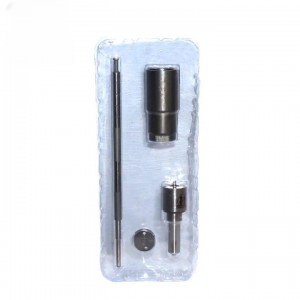Hot Selling Fuel Injector Actuator Control Solenoid Valve 4358667 Engine Parts
Products Description
| Reference Codes | 4358667 |
| Application | / |
| MOQ | 6 PCS |
| Certification | ISO9001 |
| Place of Origin | China |
| Packaging | Neutral packing |
| Quality Control | 100% tested before shipment |
| Lead time | 7~15 working days |
| Payment | T/T, L/C, Paypal, Western Union, MoneyGram or as your requirement |
Dynamic Response Optimization of Fuel Injector Electromagnetic Valves under High-Speed Operation
Abstract
The electromagnetic valve (solenoid valve) in a high-pressure fuel injector plays a critical role in controlling fuel injection timing and quantity, directly affecting engine performance, combustion efficiency, and emissions. As modern engines operate at higher speeds and tighter injection intervals, the dynamic response of the electromagnetic valve has become a major limiting factor in achieving precise and stable fuel control. This study focuses on the dynamic response optimization of fuel injector electromagnetic valves under high-speed operation through a combination of electromagnetic–mechanical coupled simulation and experimental validation.
A finite element analysis (FEA) model was developed to simulate the transient magnetic field, armature motion, and force balance within the solenoid assembly. Key parameters such as air gap size, coil turns, magnetic circuit geometry, spring stiffness, and supply voltage were systematically analyzed to determine their influence on valve response speed and stability. The results indicate that reducing the air gap by 10% increased magnetic attraction force by 18%, while optimizing coil turns and core material improved electromagnetic efficiency and minimized hysteresis losses.
To further enhance responsiveness, a multi-objective optimization algorithm based on a genetic approach was applied, targeting the minimization of opening delay and closing lag while maintaining mechanical durability. The optimized configuration achieved a 25% reduction in response delay and a 17% improvement in actuation frequency compared with the baseline design.
Thermal effects due to high-frequency operation were also analyzed using a coupled electro–thermal model, showing that coil temperature rise above 120°C significantly decreased magnetic permeability and actuation force. Implementation of improved thermal dissipation structures and low-resistance copper windings successfully limited the temperature increase to under 95°C during continuous operation.
Experimental testing on a high-speed injector bench validated the simulation results. The optimized valve maintained consistent injection timing accuracy within ±1.2% and showed stable performance across a frequency range up to 250 Hz, meeting the requirements for next-generation high-speed diesel injection systems.
In conclusion, this research demonstrates that dynamic response optimization based on coupled electromagnetic–mechanical–thermal modeling is essential for improving the performance and reliability of injector solenoid valves under high-speed conditions. The proposed design and control strategies provide a theoretical and engineering foundation for developing faster, more efficient, and thermally stable fuel injection systems for advanced combustion engines.























